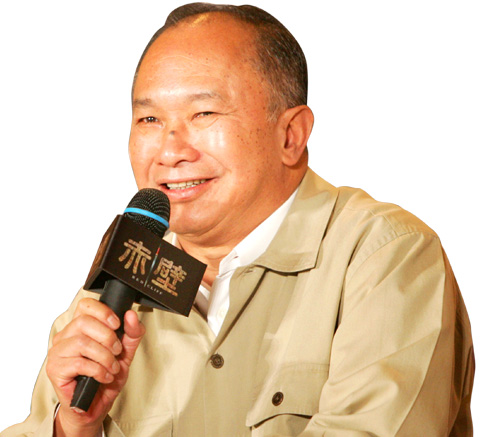The John Woo (吳宇森) epic Red Cliff (赤壁), dubbed the most expensive movie made in Asia, enjoyed record takings for a Chinese film in its opening weekend in China, the movie's distributor said on Wednesday.
The film, which depicts events in the ancient Three Kingdoms period, made US$16 million in China in the four days after its debut last week, said a China Film Group spokesman.
The box office takings beat other previous domestic blockbusters such as Curse of the Golden Flower (滿城盡帶黃金甲), directed by Olympic opening ceremony mastermind Zhang Yimou (張藝謀), as well as Taiwanese director Ang Lee's (李安) Crouching Tiger, Hidden Dragon (臥虎藏龍), Xinhua news agency said.

PHOTO: AP/TULSA WORLD
Woo, a Hong Kong film director and producer, rose to international prominence with Face Off starring John Travolta and Nicolas Cage in 1997.
He was also the director of Mission: Impossible II starring Tom Cruise.
Oscar-winning Japanese animator Hayao Miyazaki releases his first full-length film in four years this weekend, dropping computer graphics for his pencil to tell the story of a fish-girl and the sea.

PHOTO: AFP
Ponyo on the Cliff by the Sea, which the reclusive 67-year-old both wrote and directed, will hit screens at cinemas across Japan tomorrow after weeks of intense media interest.
Inspired by the 19th-century fairy tale The Little Mermaid by Danish author Hans Christian Andersen, the story centers around a tiny fish-girl, Ponyo, who rides a jellyfish to escape her home in the sea.
She meets a five-year-old human boy, Sosuke, who vows to protect her, but Ponyo is taken back to the sea. Desperate to be a human and live with Sosuke, Ponyo heads to land again with help from her sisters.
Miyazaki is one of Japan's biggest cultural exports. His last film, Howl's Moving Castle, broke opening box office records at home in 2004 before winning a cult following in Western and Asian nations.
Miyazaki, who had used computer graphics since Princess Mononoke in 1997, decided to shun hi-tech effects in his latest film.
"Our experience told us that what you can do electronically doesn't impress people much. We decided to go fully with pencils ... That's our strength," he said in a recent interview with Japanese public broadcaster NHK.
The film used 170,000 hand-drawn pictures to animate characters and objects, a record number for a Miyazaki production.
It took one and a half years for 70 staff to draw the pictures, according to Studio Ghibli, which has released his works.
Sony Corp will increase the storage capacity of its PlayStation 3 video-game console starting in September, following a similar move by Microsoft earlier this week.
The storage space on Sony's console will double to 80 gigabytes, Jack Tretton, head of Sony's US games unit, said on Tuesday. Sony also will offer movies from major studios for sale or rent through its PlayStation 3 and PSP video-game players, Tretton said.
The Class, winner of the Palme d'Or at this year's Cannes Film Festival, will open the 46th annual New York Film Festival.
The Film Society of Lincoln Center, which produces the festival, announced on Tuesday that it will give the opening night honor to Laurent Cantet's drama about classroom life at a French junior high school.
The docudrama was shot with real students and teachers in a raw, improvisational style to chronicle the drama that unfolds over one school year. The Class (Entre les Murs) was unanimously selected for the main prize at Cannes by a nine-member jury headed by Sean Penn.
It's the second film by Cantet to play at the New York Film Festival; his acclaimed Time Out was shown in 2001.
"Laurent Cantet has pioneered a new kind of social cinema,'' said selection committee chairman Richard Pena in a statement. He continued that it is a style "that explores the key issues of our day, from contemporary labor struggles to First World/Third World relations and now to education.''
This year's festival, which runs from Sept. 26 through Oct. 12, will be held at the Ziegfeld Theater due to ongoing renovations at the event's traditional home, Alice Tully Hall at Lincoln Center.

June 9 to June 15 A photo of two men riding trendy high-wheel Penny-Farthing bicycles past a Qing Dynasty gate aptly captures the essence of Taipei in 1897 — a newly colonized city on the cusp of great change. The Japanese began making significant modifications to the cityscape in 1899, tearing down Qing-era structures, widening boulevards and installing Western-style infrastructure and buildings. The photographer, Minosuke Imamura, only spent a year in Taiwan as a cartographer for the governor-general’s office, but he left behind a treasure trove of 130 images showing life at the onset of Japanese rule, spanning July 1897 to

In an interview posted online by United Daily News (UDN) on May 26, current Chinese Nationalist Party (KMT) Chairman Eric Chu (朱立倫) was asked about Taichung Mayor Lu Shiow-yen (盧秀燕) replacing him as party chair. Though not yet officially running, by the customs of Taiwan politics, Lu has been signalling she is both running for party chair and to be the party’s 2028 presidential candidate. She told an international media outlet that she was considering a run. She also gave a speech in Keelung on national priorities and foreign affairs. For details, see the May 23 edition of this column,

The Taiwan People’s Party (TPP) on May 18 held a rally in Taichung to mark the anniversary of President William Lai’s (賴清德) inauguration on May 20. The title of the rally could be loosely translated to “May 18 recall fraudulent goods” (518退貨ㄌㄨㄚˋ!). Unlike in English, where the terms are the same, “recall” (退貨) in this context refers to product recalls due to damaged, defective or fraudulent merchandise, not the political recalls (罷免) currently dominating the headlines. I attended the rally to determine if the impression was correct that the TPP under party Chairman Huang Kuo-Chang (黃國昌) had little of a

At Computex 2025, Nvidia CEO Jensen Huang (黃仁勳) urged the government to subsidize AI. “All schools in Taiwan must integrate AI into their curricula,” he declared. A few months earlier, he said, “If I were a student today, I’d immediately start using tools like ChatGPT, Gemini Pro and Grok to learn, write and accelerate my thinking.” Huang sees the AI-bullet train leaving the station. And as one of its drivers, he’s worried about youth not getting on board — bad for their careers, and bad for his workforce. As a semiconductor supply-chain powerhouse and AI hub wannabe, Taiwan is seeing